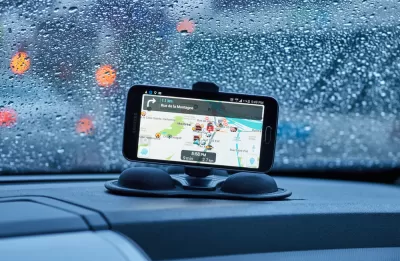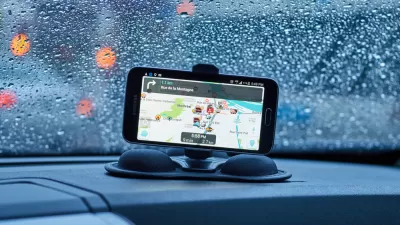Accounts of disgruntled residents responding by any means necessary to the flood of cars beckoned by the whims of navigation apps like Waze are spreading across the country.

Steve Hendrix reports on the ongoing battle between residents of residential streets and navigation apps like Waze. Hendrix specifically cites the example of Timothy Connor, who lives in Takoma Park, Maryland and has become so frustrated by the number of cars on his street as a result of a nearby street repair.
Hendrix reports that Connor "borrowed a tactic he read about from the car wars of Southern California and other traffic-weary regions: He became a Waze impostor. Every rush hour, he went on the Google-owned social-media app and posted false reports of a wreck, speed trap or other blockage on his street, hoping to deflect some of the flow."
Eventually Waze discovered Connor's tactic and stopped registering his reports, "[making] Connor a casualty in the social-media skirmishes erupting across the country as neighborhoods try to contend with suddenly savvy drivers finding their way on routes that were once all but secret."
Hendrix looks around the country for more examples of the methods by which cities and residents are countering the traffic effects of navigation algorithms. Hendrix also reports Waze's response, both in suspending users suspected of "tampering with the map" and in adding new features to the app, like "alerts about school zones and other slow-speed zones…"
FULL STORY: Traffic-weary homeowners and Waze are at war, again. Guess who’s winning?

Alabama: Trump Terminates Settlements for Black Communities Harmed By Raw Sewage
Trump deemed the landmark civil rights agreement “illegal DEI and environmental justice policy.”

Planetizen Federal Action Tracker
A weekly monitor of how Trump’s orders and actions are impacting planners and planning in America.

The 120 Year Old Tiny Home Villages That Sheltered San Francisco’s Earthquake Refugees
More than a century ago, San Francisco mobilized to house thousands of residents displaced by the 1906 earthquake. Could their strategy offer a model for the present?

In Both Crashes and Crime, Public Transportation is Far Safer than Driving
Contrary to popular assumptions, public transportation has far lower crash and crime rates than automobile travel. For safer communities, improve and encourage transit travel.

Report: Zoning Reforms Should Complement Nashville’s Ambitious Transit Plan
Without reform, restrictive zoning codes will limit the impact of the city’s planned transit expansion and could exclude some of the residents who depend on transit the most.

Judge Orders Release of Frozen IRA, IIJA Funding
The decision is a victory for environmental groups who charged that freezing funds for critical infrastructure and disaster response programs caused “real and irreparable harm” to communities.
Urban Design for Planners 1: Software Tools
This six-course series explores essential urban design concepts using open source software and equips planners with the tools they need to participate fully in the urban design process.
Planning for Universal Design
Learn the tools for implementing Universal Design in planning regulations.
Clanton & Associates, Inc.
Jessamine County Fiscal Court
Institute for Housing and Urban Development Studies (IHS)
City of Grandview
Harvard GSD Executive Education
Toledo-Lucas County Plan Commissions
Salt Lake City
NYU Wagner Graduate School of Public Service



























